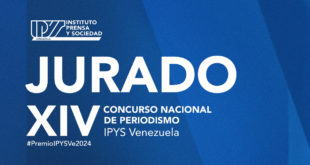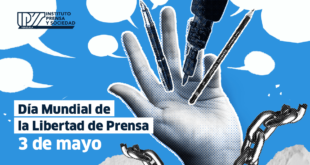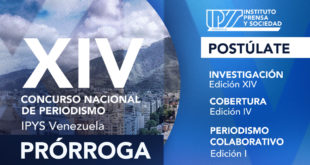El 23 de julio de 2013, el Tribunal Primero de Juicio del estado Bolívar ordenó una medida de censura contra el Correo del Caroní, periódico privado local sobre el caso de Yamal Mustafá, empresario imputado por el Ministerio Público por presunta vinculación en hechos de corrupción en la industria básica estatal Ferrominera del Orinoco, y dueño del diario privado local Primicia. Según información publicada en este último periódico el 22 de julio, el tribunal también admitió la demanda penal contra David Natera, presidente del Correo del Caroní, por los supuestos delitos de difamación e injuria interpuesta por Mustafá.
En la notificación enviada, el 24 de julio de 2013, a David Natera y a la directiva del Correo del Caroní el tribunal ordenó al periódico a que “se abstenga de publicar o permitir publicar, informaciones subjetivas o prejuiciosas, emitidas de manera directas o indirectas, simuladas o figuradas, relacionadas al ciudadano Yamal Mustafá, así como referido a cualquier otro proceso penal que se llegue a instaurar contra su persona, que pudiere interpretarse como lesiva de sus derechos constitucionales, como lo es el debido proceso, presunción de inocencia, del derecho al honor y reputación y del derecho a la integridad de las personas y las familias, procediendo a publicar información de manera objetiva y apegada a la ética periodística” (http://www.correodelcaroni.com/images/stories/dia250713/A6DOCUMENTO2.jpg)
El tribunal expresó que la medida debe ser acatada hasta tanto esta dependencia no resuelva el asunto de fondo de la demanda penal interpuesta contra Natera, por parte de Yamal Mustafá por los supuestos delitos de difamación e injuria, el 15 de julio de 2013.
Oscar Murillo, jefe de redacción del Correo del Caroní informó a IPYS Venezuela que esta medida representa una notificación y que el tribunal aún no citado a los involucrados para realizar la audiencia de presentación por este caso.
El caso
Murillo explicó que esta acción de censura se tomó luego de que el periódico -fundamentado en fuentes oficiales y voceros conocidos públicamente- informara sobre el procedimiento judicial en el que supuestamente se involucra a Yamal Mustafá, en calidad de empresario, a quien el Ministerio Público imputó “por ser presuntamente cooperador inmediato en el delito de peculado doloso propio, concertación de funcionario público con contratista y asociación para delinquir”, en el caso de supuesta corrupción en Ferrominera del Orinoco, industria básica estatal (http://bit.ly/16XB900).
IPYS Venezuela ha reiterado que el procedimiento que enfrenta Yamal Mustafá se da por actividades ajenas a su gestión como dueño del diario Primicia.
Por el caso de corrupción de Ferrominera del Orinoco han sido detenidos y sometidos a investigaciones otras 6 personas, aparte de Mustafá, entre ellas: Radwan Sabbagh, ex presidente de la empresa estatal; Juan Carlos Álvarez Dionisi, coronel de la Dirección General de Contrainteligencia Militar en la entidad; las ex gerentes de la industria María Rodríguez, Carolina Acosta; ex consultor jurídico Noel Ramírez; y Carlos Vieira, cliente de Ferrominera Orinoco.
A pesar de que este caso está vinculado a otros incidentes por supuesta corrupción en la industria básica, la medida del tribunal solo prohíbe al Correo del Caroní referirse al procedimiento que afronta Yamal Mustafá.
Admisión de la demanda penal
Antes que el tribunal hiciera llegar la notificación al Correo del Caroní, el diario Primicia, en su edición del 22 de julio, informó sobre este procedimiento. De acuerdo a la nota presentada por este diario -propiedad de Mustafá- el tribunal habría decretado “la admisión parcial de la acusación privada, o querella interpuesta por Mustafá contra Natera y ordenó ´la comparecencia de este para que nombre abogado y/o defensor de confianza que lo asista´.
Sin embargo, Oscar Murillo y David Natera informaron a IPYS Venezuela que la institución judicial no ha notificado al presidente del Correo del Caroní de la admisión de esta acción penal.
Primicia, también, informó que el tribunal “declaró inadmisible la querella en contra de Andrés Velásquez por ´encontrarse amparado por la prerrogativa de inmunidad parlamentaria establecida en el artículo 200 de la Constitución de la República Bolivariana de Venezuela” (http://www.primicia.com.ve/politica/tribunales-admitieron-querella-penal-contra-david-natera.html#sthash.dp9I9Mkj.dpuf)
Precedentes
Como informó IPYS Venezuela, el 15 de julio de 2013 se presentó en contra del diputado de la Asamblea Nacional, Andrés Velásquez, por las denuncias que ha presentado sobre este caso. En la querella, Mustafá solicitó a la instancia judicial una medida de censura para prohibir al Correo del Caroní y a los medios locales difundir informaciones sobre las investigaciones legales que están en curso por supuestos hechos de corrupción en Ferrominera del Orinoco (FMO) -empresa estatal que forma parte de las industrias básicas de Guayana- por los que emprendió esta medida legal (http://ipys.org.ve/alerta?id=3535&y=2013&m=07).
De igual manera, el 18 de julio Mustafá presentó una demanda civil por “daños y prejuicios” contra diario privado local Correo del Caroní y a su presidente David Natera, procedimiento que podría derivar en una sanción tributaria (http://ipys.org.ve/alerta?id=3540&y=2013&m=07).
Intimidaciones contra Primicia
Entre tanto, el director de Primicia, Robinson Lizano informó a IPYS Venezuela que estas disputas representan diferencias personales entre Mustafá y Natera. Además, explicó que se promueve una campaña de descrédito contra el diario para el que labora. IPYS Venezuela, también, informó sobre acciones de intimidación que afectan a Lizano y a los periodistas que pertenecen a su equipo de trabajo (http://ipys.org.ve/alerta?id=3542&y=2013&m=07).
Violación a la libertad de expresión
IPYS Venezuela rechaza cualquier medida que busque censurar a los medios de comunicación y a los periodistas a informar sobre hecho de interés público.
Las medidas de prohibición informativa de asuntos de interés público son contrarias a las disposiciones de la libertad de expresión. El artículo 57 de la Constitución de la República Bolivariana de Venezuela establece que no se admiten medidas de censura.
La Declaración de Principios sobre Libertad de Expresión -promovida por la Relatoría Especial para la Libertad de Expresión de la Organización de Estados Americanos- establece: “La censura previa, interferencia o presión directa o indirecta sobre cualquier expresión, opinión o información difundida a través de cualquier medio de comunicación oral, escrito, artístico, visual o electrónico, debe estar prohibida por la ley. Las restricciones en la circulación libre de ideas y opiniones, como así también la imposición arbitraria de información y la creación de obstáculos al libre flujo informativo, violan el derecho a la libertad de expresión”.
_________________________________________________________________________________________
Lea la versión en inglés
Bolívar: Court ordered local newspaper to censor information on legal proceedings on alleged corruption charges
On July 23, 2013, the first court on trials of Bolívar state issued a gag order against el Correo del Caroní, a private local newspaper, on the case involving Yamal Mustafá, a businessman charged by the public prosecutor for his alleged link with corruption charges at state-owned basic industry company Ferrominera del Orinoco, and owner of private local newspaper Primicia. Based on information published in this latter newspaper on July 22, the court also accepted a criminal lawsuit filed by Mustafá against David Natera, president of the Correo del Caroní, for the alleged crimes of slander and injury.
In the notification sent on July 24, 2013 to David Natera and the board of directors of the Correo del Caroní the court instructed the newspaper to “abstain from publishing or permitting the publication of subjective or prejudiced information issued directly or indirectly, simulated or figuratively, related to citizen Yamal Mustafá, as well as any news referring to any other criminal proceeding started against him which could be interpreted as prejudicial to his constitutional rights, such as his right to due process, presumption of innocence, the right to defend his honor and reputation and the right to a person´s integrity and that of his family members, and to proceed to publish information that is objective and as per journalistic ethics”. (http://www.correodelcaroni.com/images/stories/dia250713/A6DOCUMENTO2.jpg)
The court expressed that the gag order must be obeyed until that office has solved the issue at stake in the criminal lawsuit filed against Natera by Yamal Mustafá on July 15, 2013 for the alleged crimes of slander and injury.
Oscar Murillo, chief editor of the Correo del Caroní, informed IPYS Venezuela that this measure represents a notification and the court has yet to subpoena the parties involved to conduct the initial hearing on this case.
The case
Murillo explained that this gag order took place after the newspaper –based on official sources and publicly-known spokespersons- informed on the legal proceedings in which Yamal Mustafá is allegedly involved as a businessman and has been charged by the public prosecutor “for allegedly being an immediate collaborator in the crime of culpable embezzlement for his own gain, colluding with a public official and a contractor and associating with delinquents for criminal purposes”, in the alleged corruption case at Ferrominera del Orinoco, a state-owned basic industry (http://bit.ly/16XB900).
IPYS Venezuela has reiterated that the proceedings involving Yamal Mustafá are on activities that have nothing to do with his role as the owner of Primicia newspaper.
Six other persons besides Mustafá have been arrested and subjected to investigation on the corruption case of Ferrominera del Orinoco, including: Radwan Sabbagh, the previous president of the state company; Juan Carlos Álvarez Dionisi, colonel at the military counterintelligence department of that state; former managers of the industry María Rodríguez and Carolina Acosta; the former legal consultant Noel Ramírez and Carlos Vieira, client of Ferrominera Orinoco.
Although this case is linked to other incidents of alleged corruption in the basic industry, the court´s order only prohibits the Correo del Caroní from referring to the proceedings involving Yamal Mustafá.
Acceptance of the criminal lawsuit
Prior to the court issuing the gag order to the Correo del Caroní, Primicia newspaper informed on this in its July 22 issue. According to the note published by that newspaper –owned by Mustafá- the court had decreed “the partial admission of the private accusation or complaint filed by Mustafá against Natera and ordered ´his appearance in court and the designation of an attorney and/or trusted defendant to assist him´.
However, Oscar Murillo and David Natera informed IPYS Venezuela that the legal institution has not notified the president of the Correo del Caroní on the admission of this legal action.
Primicia also informed that the court “declared inadmissible the complaint against Andrés Velásquez since he is ´protected by the parliamentary immunity prerogative as set forth in article 200 of the Constitution of the Bolivarian Republic of Venezuela” (http://www.primicia.com.ve/politica/tribunales-admitieron-querella-penal-contra-david-natera.html#sthash.dp9I9Mkj.dpuf)
Precedent
As informed by IPYS Venezuela, a lawsuit was filed on July 15, 2013 against national assembly congressman Andrés Velásquez, for statements made by him on this case. In the complaint, Mustafá requested that the legal instance issue a gag order prohibiting the Correo del Caroní and the local media from publishing information on the ongoing legal inquiries on the alleged corruption charges at Ferrominera del Orinoco (FMO) –a state-owned company which is one of the basic industries in Guayana- on account of which he filed this lawsuit (http://ipys.org.ve/alerta?id=3535&y=2013&m=07).
Likewise, on July 18 Mustafá filed a civil lawsuit for “damages and prejudice” against the local private newspaper El Correo del Caroní and its president David Natera, a proceeding which could derive in a monetary sanction (http://ipys.org.ve/alerta?id=3540&y=2013&m=07).
Intimidatory actions against Primicia
Meanwhile, Robinson Lizano, the director of Primicia, informed IPYS Venezuela that these disputes represent personal differences between Mustafá and Natera. He also explained that a smear campaign is ongoing against the newspaper he works for. IPYS Venezuela also informed on intimidation actions affecting Lizano and the journalists who are members of his work crew. (http://ipys.org.ve/alerta?id=3542&y=2013&m=07).
Violations against freedom of expression
IPYS Venezuela rejects any measure which seeks to censor the media and the journalists on informing on affairs of public interest.
The gag measures forbidding the informing of affairs of public interest run counter to the provisions on freedom of expression. Article 57 of the Constitution of the Bolivarian Republic of Venezuela establishes that no censorship measures are admitted.
The Declaration of Principles on the Freedom of Expression -promoted by the OAS´ Special Racconteur for Freedom of Expression- establishes that: “previous censorship, interference or the direct or indirect pressure on any expression, opinion or information aired through any verbal, written, artistic, visual or electronic media must be forbidden by law. Restrictions on the free circulation of ideas and opinions, as well as the arbitrary imposition of information and the creation of obstacles to the free flow of information violate the right to freedom of expression”.
Label: criminal action, prior censorship
 IPYS Instituto Prensa y Sociedad Venezuela
IPYS Instituto Prensa y Sociedad Venezuela



